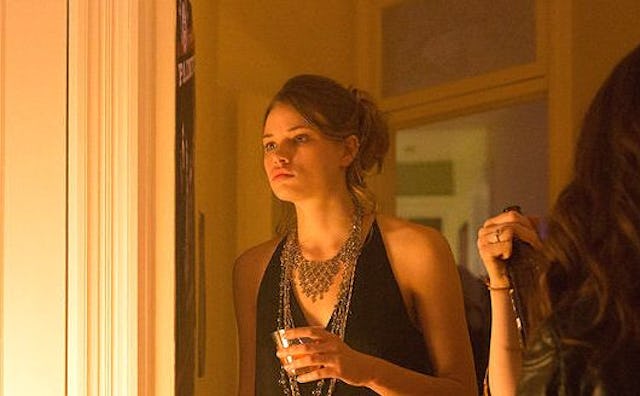'The Slap,' Episode Five: One Small Move

Connie bikes home to her mother, Vivian, and property-manager stepfather, Tony. They harangue her for minor infractions in an unpleasant dinner table conversation that leaves the viewer hoping that Connie goes to Berkeley and leaves this pair far behind. Connie, angling to see Hector, dolls herself up and attends Gary’s art opening—a display of enormous, close-up portraits of his son, the “great god Hugo,” as Gary describes him, the all-demanding, all-consuming child as both deity and muse to his helpless parents.
Connie and Hector flirt at the party—Aisha is working—until Hector finally tells Connie that he’s sorry he led her on, but that these leading-to-an-affair-but-not-quite shenanigans have to stop. Connie, devastated, leaves and finds Richie at a friend’s party. Wobbly on Vicodin and booze, she makes a drunken pass at him that he deflects.
The next day, Tony delivers a letter to a hungover Connie, a letter from her late father’s friend Malcolm. She prevails on Richie to drive her to visit him; she learns that Malcolm was her father’s lover as well as his druggy bandmate. He’s kept boxes of music, half-finished manuscripts and other mementos to give to her. Malcolm provides a more nuanced backstory to her mother and father’s break-up: her dad left Malcolm for Vivian, determined to be a husband and father, but when that ended, returned to Malcolm. “Time is the only villain here,” Malcolm tells her, in ill health himself.
The dead parents are stacking up in The Slap: Harry’s parents; Anouk’s father and soon, mother; Connie’s father. And while the conscious choices parents make are front and center—Rosie’s nursing of 5-year-old Hugo, Harry’s aggressive pep talks to his son—it’s the legacies we can’t control that are the most important: our unconscious actions, all the tiny, inconsequential decisions, and finally, our deaths.
Connie takes a gift of cupcakes to Rosie, who’s sitting with the order for a psych evaluation of Hugo. Rosie seems uneasy—Harry might have found her Achilles heel in this war: Is Hugo troubled? Is that her fault? (We’re eagerly awaiting the backstory here.) In the struggle to protect their children, characters in The Slap inadvertently unleash larger and larger troubles upon their little Brooklyn world. Rosie, in defending her son against Harry, has exposed him to potentially greater danger.
Connie tells Rosie that Richie’s photographs clearly show the event of the slap—that Hugo was not holding the bat when Harry hit him. That they show other events too, like Hector and Connie’s dalliance under the stairs, appears to be a can of worms she’s willing to open.
The Slap is a struggle for control, for supremacy, in an uncertain, changing world. Each character thinks he or she is fighting the fight of the righteous, but every parry and feint unleashes unintended new consequences. One small move, and a civilization shifts.
This article was originally published on